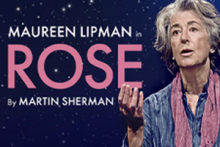Rose starring Maureen Lipman in the West End – review
The one woman show runs at the Ambassadors Theatre until 17 June

“It’s not religious, it’s just Jewish” observes Rose as she sits poised and elegant upon her wooden bench. Rose is sitting Shiva, the Jewish custom to mourn and honour the dead – it’s a slow and devastating reveal before we ultimately find out who she mourns for in Martin Sherman’s brilliantly observed and beautifully performed one woman show.
Maureen Lipman first performed the piece online during lockdown and has since brought Rose to life at the Hope Mill in Manchester as well as London’s Park Theatre. Now transferring into the West End, this is a play that resonates even more today than it did when it was first seen over 20 years ago. The war in Ukraine and the refugee crisis are news pretty much every night and horrible stories of antisemitism seemingly show no signs of abating. It’s all something that Rose is only too familiar with as she shares her poignant reflections on her 80-year life.
Born in Ukraine, the middle child of three to a father that was “always dying” and a mother that was seen as a saint by others but that showed “no pride in her children”, Rose and her family escaped their shtetel for a better life in Poland. It’s not long before the Nazis roll in and herd the family into one of the terrible Warsaw ghettoes, where Rose describes their home as a “dwelling” simply because she can’t bring herself to call it a house, and where she is too afraid to even sleep at night.
Sherman’s words and Lipman’s delivery of them paint a vivid picture of everything that Rose has endured, it’s not always comfortable to listen to but listen we must, mainly because Lipman is so transfixing in her understated and no-fuss performance. “Jews are not visual, look at what we wear” she says candidly with a shrug of her shoulders and a wry smile. Every self-effacing line is given such warmth and humour that it makes Lipman’s occasional bursts of anger all the more shocking and the subtle emotion from her as tears run down her face all the more absorbing.
Sherman furnishes Rose with vulnerabilities and doubt, sometimes she fears that her memories aren’t real and that she has them confused with scenes from Fiddler on the Roof. The Pogroms, the ghettoes, the Nazis – all so familiar from history books and popular culture now that it is all too easy to forget that these were real people – Lipman doesn’t let us forget.
In Sherman’s programme notes he comments that “a refugee only receives cosmetic refuge”. It’s a point that is driven home throughout. Rose never rests and even once she finds herself immersed in the American dream, it is still an unsettled life with a sense that she never quite belongs.
Director Scott Le Crass recognises the need for simplicity and understatement, reflected also in David Shields’ less-is-more set design. The subtle lighting of Jane Lalljee and gentle soundscape offered by Julian Starr all lend themselves to nurturing the shadows of Rose’s past as Lipman engrossingly ploughs on with impressive stamina and unrelenting emotional depth. This is a devastating performance from one of our greatest actors and lays bare the brutality of humanity, the futility of war and the enduring capacity for love and forgiveness.
There are moments, especially in the second act, where the text wanders a little. Sherman becomes needlessly distracted by thoughts of the supernatural and of a possible reunion. He quickly rights this deviation, however. Early on, Rose talks of the sovereignty of her home country of Ukraine and asks, “who would want it?”. These are the moments of astute clarity and almost premonition-like detail that Sherman really strikes home.
But this night is for Lipman. She wows with this still and utterly gripping performance. Funny, heartbreaking and fierce all at once, this is a masterclass in acting. There really is nothing quite like a Dame.
















